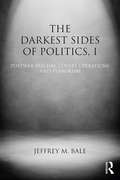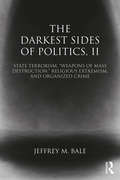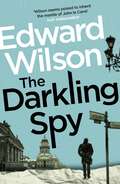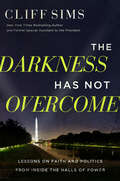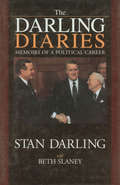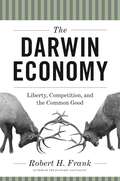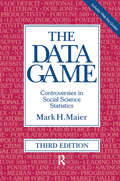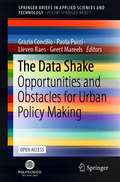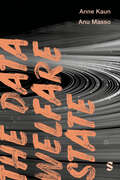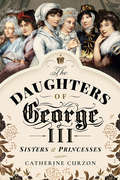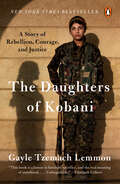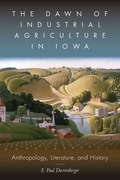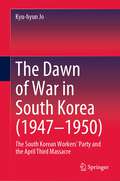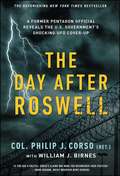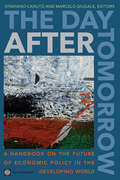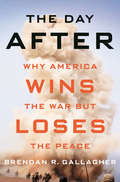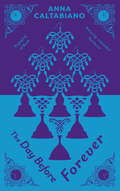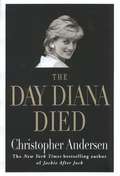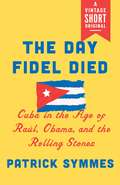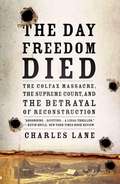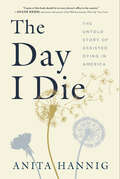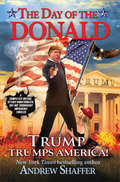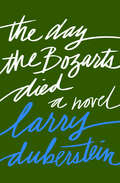- Table View
- List View
The Darkest Sides of Politics, I: Postwar Fascism, Covert Operations, and Terrorism (Routledge Studies in Extremism and Democracy)
by Jeffrey M. BaleThis book examines a wide array of phenomena that arguably constitute the most noxious, extreme, terrifying, murderous, secretive, authoritarian, and/or anti-democratic aspects of national and international politics. Scholars should not ignore these "dark sides" of politics, however unpleasant they may be, since they influence the world in a multitude of harmful ways. The first volume in this two-volume collection focuses on the history of underground neo-fascist networks in the post-World War II era; neo-fascist paramilitary and terrorist groups operating in Europe and Latin America in the 1960s and 1970s; and the manipulation of those and other terrorist organizations by the security forces of various states, both authoritarian and democratic. A range of global case studies are included, all of which focus on the lesser known activities of certain secular extremist milieus. This collection should prove to be essential reading for students and researchers interested in understanding seemingly arcane but nonetheless important dimensions of recent historical and contemporary politics.
The Darkest Sides of Politics, II: State Terrorism, “Weapons of Mass Destruction,” Religious Extremism, and Organized Crime (Routledge Studies in Extremism and Democracy)
by Jeffrey M. BaleThis book examines a wide array of phenomena that arguably constitute the most noxious, extreme, terrifying, murderous, secretive, authoritarian, and/or anti-democratic aspects of national and international politics. Scholars should not ignore these "dark sides" of politics, however unpleasant they may be, since they influence the world in a multitude of harmful ways. The second volume in this two-volume collection focuses primarily on assorted religious extremists, including apocalyptic millenarian cults, Islamists, and jihadist terrorist networks, as well as CBRN (chemical, biological, radiological, and nuclear) terrorism and the supposedly new "nexus" between organized criminal and extremist groups employing terrorist operational techniques. A range of global case studies are included, most of which focus on the lesser known activities of certain religious extremist milieus. This collection should prove to be essential reading for students and researchers interested in understanding seemingly arcane but nonetheless important dimensions of recent historical and contemporary politics.
The Darkling Spy (William Catesby)
by Edward WilsonA spy thriller that will change your view of the Cold War forever, by a former special forces officer and 'the thinking person's John le Carre''The thinking person's John le Carré' Tribune 'Edward Wilson seems poised to inherit the mantle of John le Carré' Irish Independent'More George Smiley than James Bond, Catesby will delight those readers looking for less blood and more intelligence in their spy thrillers' Publishers WeeklyLondon, 1956. A generation of British spies are haunted by the ghosts of friends turned traitor. Henry Bone, a Mandarin spymaster, learns that Butterfly is the Holy Grail of Cold War Intelligence. In reality, he is an aristocratic pervert whose political tastes are as ugly as his sexual preferences. But worst of all for some, Butterfly can identify each traitor ghost and every serving British spy who helped them. Catesby, a spy with his reputation in tatters, is pressured to become a fake defector in order to track down Butterfly. Catesby's quest leads him from Berlin, through a shower of Molotov cocktails in Budapest and finally to dinner alone with the East German espionage legend, Mischa Wolf. The novel's shocking conclusion will change the reader's view of the Cold War forever.'Smart, finely written' Publishers Weekly Starred Review'All you could want in a spy thriller' Oliver JamesPraise for Edward Wilson:'Stylistically sophisticated . . . Wilson knows how to hold the reader's attention' W.G. Sebald'A reader is really privileged to come across something like this' Alan Sillitoe
The Darkness Has Not Overcome: Lessons on Faith and Politics from Inside the Halls of Power
by Cliff SimsFormer special assistant to President Trump, New York Times bestselling author, and evangelical Christian Cliff Sims shares the lessons he learned on faith, politics, and the Christian witness while working in the halls of power. American life today is consumed by politics. Even our churches are tearing themselves apart over political candidates, cultural flashpoints, and debates about whether certain pastors are vessels for the Holy Spirit or an unholy political agenda. So how should Christians approach our lives in this time of strife and division? How should we engage in politics and respond when we find that our beliefs are at odds with the culture? And how do we keep our focus on eternity when the present attractions of the world are there in front of us at every turn? Cliff Sims, the son of a Baptist minister and man of deep Christian faith, has walked the halls of power, serving as a Special Assistant to President Trump and Deputy Director of National Intelligence. While working at the highest levels of the American government, he experienced firsthand the cutthroat world of power politics, an environment that can test the character of any follower of Jesus, and he wrestled continually with how to live out his faith. In this book, Cliff shares hard-earned wisdom from his time serving in government, giving Christians lessons on how to live faithfully and with integrity. Recounting stories from the West Wing, Air Force One, and top secret bunkers, Sims offers practical advice and biblical insight on how to let the light of Christ shine in our dark world, regardless of our politics. The Darkness Has Not Overcome is a must-read for every Christian who has found themselves exasperated by politics, fearful about the future, or discouraged by the times in which we live.
The Darling Diaries: Memoirs of a Political Career
by Beth Slaney Stan DarlingA stalwart Tory, Stan Darling was a Member of Parliament for twenty-one years. In The Darling Diaries, he looks back on his career in politics, the places he has been, and some of the people he has met — Libyan dictator Gaddafi, President Bush, and Maharishi Mahesh Yogi. Never afraid of the press or anyone else foolish enough to quarrel with him, he strenuously advocated (and got) controls on the emissions which cause acid rain — for which he earned the nickname Mr. Acid Rain. He helped to get a free vote on the death penalty in Parliament. Whether in his native Burks Falls, Ontario, or abroad, Darling fought the good fight in many other causes. The reader follows Darling abroad to both the ex-Yugoslavia and the ex-Soviet Union, as well as to Nigeria, the Middle East, and the People’s Republic of China.
The Darwin Economy: Liberty, Competition, and the Common Good
by Robert H. FrankWhat Charles Darwin can teach us about building a fairer societyWho was the greater economist—Adam Smith or Charles Darwin? The question seems absurd. Darwin, after all, was a naturalist, not an economist. But Robert Frank, New York Times economics columnist and best-selling author of The Economic Naturalist, predicts that within the next century Darwin will unseat Smith as the intellectual founder of economics. The reason, Frank argues, is that Darwin's understanding of competition describes economic reality far more accurately than Smith's. And the consequences of this fact are profound. Indeed, the failure to recognize that we live in Darwin's world rather than Smith's is putting us all at risk by preventing us from seeing that competition alone will not solve our problems.Smith's theory of the invisible hand, which says that competition channels self-interest for the common good, is probably the most widely cited argument today in favor of unbridled competition—and against regulation, taxation, and even government itself. But what if Smith's idea was almost an exception to the general rule of competition? That's what Frank argues, resting his case on Darwin's insight that individual and group interests often diverge sharply. Far from creating a perfect world, economic competition often leads to "arms races," encouraging behaviors that not only cause enormous harm to the group but also provide no lasting advantages for individuals, since any gains tend to be relative and mutually offsetting.The good news is that we have the ability to tame the Darwin economy. The best solution is not to prohibit harmful behaviors but to tax them. By doing so, we could make the economic pie larger, eliminate government debt, and provide better public services, all without requiring painful sacrifices from anyone. That's a bold claim, Frank concedes, but it follows directly from logic and evidence that most people already accept.In a new afterword, Frank further explores how the themes of inequality and competition are driving today's public debate on how much government we need.
The Data Game: Controversies in Social Science Statistics (Habitat Guides)
by Mark Maier Jennifer ImazekiNow updated for web-based research, the third edition of The Data Game introduces students to the collection, use, and interpretation of statistical data in the social sciences. Separate chapters are devoted to data in the fields of demography, housing, health, education, crime, the national economy, wealth, income and poverty, labor, business, government, and public opinion polling. The concluding chapter is devoted to the common problem of ambiguity in social science statistics.
The Data Shake: Opportunities and Obstacles for Urban Policy Making (SpringerBriefs in Applied Sciences and Technology)
by Grazia Concilio Paola Pucci Lieven Raes Geert MareelsThis open access book represents one of the key milestones of PoliVisu, an H2020 research and innovation project funded by the European Commission under the call “Policy-development in the age of big data: data-driven policy-making, policy-modelling and policy-implementation”. It investigates the operative and organizational implications related to the use of the growing amount of available data on policy making processes, highlighting the experimental dimension of policy making that, thanks to data, proves to be more and more exploitable towards more effective and sustainable decisions. The first section of the book introduces the key questions highlighted by the PoliVisu project, which still represent operational and strategic challenges in the exploitation of data potentials in urban policy making. The second section explores how data and data visualisations can assume different roles in the different stages of a policy cycle and profoundly transform policy making.
The Data Welfare State (Data Justice)
by Anne Kaun Anu MassoAutomation is a reality of the modern world, yet it is fraught with contradictions. On the surface it appears sleek, efficient and seamlessly integrated, and yet it is also changing, uncertain, troubling. This book delves into that frictional interface, exploring themes like welfare automation experiments, citizen resistance, and the invisible technology woven into our lives. In this book you will encounter: - An international perspective, with examples drawn from Germany, Sweden and Estonia - Diverse viewpoints, from welfare professionals to citizens who rely on welfare services - A bold vision and urgent call to action, advocating for the reorganization of the data welfare state Fascinating and timely, this book is essential reading for anyone interested in data welfare. Published in collaboration with the Data Justice Lab as part of the Data Justice Series (Editors: Lina Dencik, Arne Hintz, Joanna Redden and Emiliano Treré)
The Data Welfare State (Data Justice)
by Anne Kaun Anu MassoAutomation is a reality of the modern world, yet it is fraught with contradictions. On the surface it appears sleek, efficient and seamlessly integrated, and yet it is also changing, uncertain, troubling. This book delves into that frictional interface, exploring themes like welfare automation experiments, citizen resistance, and the invisible technology woven into our lives. In this book you will encounter: - An international perspective, with examples drawn from Germany, Sweden and Estonia - Diverse viewpoints, from welfare professionals to citizens who rely on welfare services - A bold vision and urgent call to action, advocating for the reorganization of the data welfare state Fascinating and timely, this book is essential reading for anyone interested in data welfare. Published in collaboration with the Data Justice Lab as part of the Data Justice Series (Editors: Lina Dencik, Arne Hintz, Joanna Redden and Emiliano Treré)
The Daughters of George III: Sisters & Princesses
by Catherine CurzonAn in-depth look into the lives of the six daughters of King George III of England.In the dying years of the 18th century, the corridors of Windsor echoed to the footsteps of six princesses. They were Charlotte, Augusta, Elizabeth, Mary, Sophia, and Amelia, the daughters of King George III and Queen Charlotte of Mecklenburg-Strelitz. Though more than fifteen years divided the births of the eldest sister from the youngest, these princesses all shared a longing for escape. Faced with their father’s illness and their mother’s dominance, for all but one a life away from the seclusion of the royal household seemed like an unobtainable dream.The six daughters of George III were raised to be young ladies and each in her time was one of the most eligible women in the world. Tutored in the arts of royal womanhood, they were trained from infancy in the skills vital to a regal wife but as the king’s illness ravaged him, husbands and opportunities slipped away.Yet even in isolation, the lives of the princesses were filled with incident. From secret romances to dashing equerries, rumors of pregnancy, clandestine marriage and even a run-in with Napoleon, each princess was the leading lady in her own story, whether tragic or inspirational. In The Daughters of GeorgeIII, take a wander through the hallways of the royal palaces, where the king’s endless ravings echo deep into the night and his daughters strive to be recognized not just as princesses, but as women too.Praise for The Daughters of George III“This fascinating look at the lives and times of the six daughters of George III and Queen Charlotte delivers an engaging read for enthusiasts of the royals and British history.” —Library Journal
The Daughters of George III: Sisters & Princesses
by Catherine CurzonAn in-depth look into the lives of the six daughters of King George III of England.In the dying years of the 18th century, the corridors of Windsor echoed to the footsteps of six princesses. They were Charlotte, Augusta, Elizabeth, Mary, Sophia, and Amelia, the daughters of King George III and Queen Charlotte of Mecklenburg-Strelitz. Though more than fifteen years divided the births of the eldest sister from the youngest, these princesses all shared a longing for escape. Faced with their father’s illness and their mother’s dominance, for all but one a life away from the seclusion of the royal household seemed like an unobtainable dream.The six daughters of George III were raised to be young ladies and each in her time was one of the most eligible women in the world. Tutored in the arts of royal womanhood, they were trained from infancy in the skills vital to a regal wife but as the king’s illness ravaged him, husbands and opportunities slipped away.Yet even in isolation, the lives of the princesses were filled with incident. From secret romances to dashing equerries, rumors of pregnancy, clandestine marriage and even a run-in with Napoleon, each princess was the leading lady in her own story, whether tragic or inspirational. In The Daughters of GeorgeIII, take a wander through the hallways of the royal palaces, where the king’s endless ravings echo deep into the night and his daughters strive to be recognized not just as princesses, but as women too.Praise for The Daughters of George III“This fascinating look at the lives and times of the six daughters of George III and Queen Charlotte delivers an engaging read for enthusiasts of the royals and British history.” —Library Journal
The Daughters of Kobani: A Story of Rebellion, Courage, and Justice
by Gayle Tzemach LemmonThe extraordinary story of the women who took on the Islamic State and won <P><P>In 2014, northeastern Syria might have been the last place you would expect to find a revolution centered on women's rights. But that year, an all-female militia faced off against ISIS in a little town few had ever heard of: Kobani. By then, the Islamic State had swept across vast swaths of the country, taking town after town and spreading terror as the civil war burned all around it. From that unlikely showdown in Kobani emerged a fighting force that would wage war against ISIS across northern Syria alongside the United States. In the process, these women would spread their own political vision, determined to make women's equality a reality by fighting--house by house, street by street, city by city--the men who bought and sold women. <P><P>Based on years of on-the-ground reporting, The Daughters of Kobani is the unforgettable story of the women of the Kurdish militia that improbably became part of the world's best hope for stopping ISIS in Syria. Drawing from hundreds of hours of interviews, bestselling author Gayle Tzemach Lemmon introduces us to the women fighting on the front lines, determined to not only extinguish the terror of ISIS but also prove that women could lead in war and must enjoy equal rights come the peace. In helping to cement the territorial defeat of ISIS, whose savagery toward women astounded the world, these women played a central role in neutralizing the threat the group posed worldwide. In the process they earned the respect--and significant military support--of U.S. Special Operations Forces.Rigorously reported and powerfully told, The Daughters of Kobani shines a light on a group of women intent on not only defeating the Islamic State on the battlefield but also changing women's lives in their corner of the Middle East and beyond. <p><p><b>A New York Times Bestseller</b>
The Dawn of Industrial Agriculture in Iowa: Anthropology, Literature, and History
by E. Paul DurrenbergerIn The Dawn of Industrial Agriculture in Iowa E. Paul Durrenberger recounts the transformation of Iowa’s family farms into today’s agricultural industry through the lens of the lives and writings of Iowa novelist Paul Corey and poet Ruth Lechlitner. This anthropological biography analyzes Corey’s fiction, Lechlitner’s poetry, and their professional and personal correspondence to offer a new perspective on an era (1925–1947) that saw the collapse and remaking of capitalism in the United States, the rise of communism in the Soviet Union, the rise and defeat of fascism around the world, and the creation of a continuous warfare state in America. Durrenberger tells the story that Corey aimed to record and preserve of the industrialization of Iowa’s agriculture and the death of its family farms. He analyzes Corey’s regionalist focus on Iowa farming and regionalism’s contemporaneous association in Europe with rising fascism. He explores Corey’s adoption of naturalism, evident in his resistance to heroes and villains, to plot structure and resolution, and to moral judgment, as well as his ethnographic tendency to focus on groups rather than individuals. An unusual and wide-ranging study, The Dawn of Industrial Agriculture in Iowa offers important insight into the relationships among fiction, individual lives, and anthropological practice, as well as into a pivotal period in American history.
The Dawn of War in South Korea (1947–1950): The South Korean Workers’ Party and the April Third Massacre
by Kyu-hyun JoThis book offers an analytical account of the April Third Massacre in Korea, a bloody confrontation between supporters of the Syngman Rhee Administration and those suspected (largely incorrectly) of being Communists, or members of the South Korean Workers' Party—the second largest Communist Party after Korea's liberation from Japanese colonial rule. As a result, some 80,000 villagers, fishermen, and policemen were killed. The book, drawing from a wide array of primary sources, ranging from South Korean governmental records, memoranda, memoirs, and recently unclassified documents, examines the role of the South Korean Workers' Party in the April Third Massacre on Jeju and how it shaped the origins of the Korean War. The author maps these origins of the Korean War from the outbreak of the April Third Massacre and through the ensuing chain of violence which included the Yo-su and Sun-ch'on Massacres of October 1948, engulfing the peninsula until 1949. Of interest to all scholars studying modern Korea, it is particularly relevant to historians focused on the Korean War, as well as political scientists and international relations experts interested in East Asian conflicts.
The Day After Roswell
by William J. Birnes Philip CorsoA breathtaking exposé that reads like a thriller, The Day After Roswell is a stunning depiction of just what happened in Roswell, New Mexico all those years ago and how the effects of this mysterious unidentified aircraft crash are still relevant today.Former member of President Eisenhower&’s National Security Council and the Foreign Technology Desk in the United States Army, Colonel Philip J. Corso was assigned to work at a strange crash site in Roswell in 1947. He had no idea that his work there would change his life and the course of history forever. Only in his fascinating memoir can you discover how he helped removed alien artifacts from the site and used them to help improve much of the technology the Army uses today, such as circuit chips, fiber optics, and more. Laying bare the United States government&’s shocking role in the Roswell incident—what was found, the cover-up, and more—The Day After Roswell is an extraordinary memoir that not only forces us to reconsider the past, but also our role in the universe.
The Day After Tomorrow: A Handbook on the Future of Economic Policy in the Developing World
by Marcelo M. Giugale Otaviano CanutoThe 2008-09 Global Financial Crisis shook the ground under the conventional wisdom that had guided mainstream development economics. Much of what had been held as true for decades is now open to reexamination-from what the role of governments should be in markets to which countries will be the engines of the world's economy, from what people need to leave poverty to what businesses need to stay competitive. Development economists look into the future. They do not just ask how things work today, but how a new policy, program, or project would make them work tomorrow. They view the world and history as a learning process-past and present are inputs into thinking about what is coming. It is that appetite for a vision of the future that led the authors of 'The Day after Tomorrow: A Handbook on the Future of Economic Policy in the Developing World' to invite some 40 development economists, most of them from the World Bank's Poverty Reduction and Economic Management Network-an epicenter of the profession-to report what they see on the horizon of their technical disciplines and of their geographic areas of specialization. The disconcerting but exciting search for a new intellectual compact has begun. To help guide the discussion, 'The Day after Tomorrow: A Handbook on the Future of Economic Policy in the Developing World' puts forth four key messages: While the developed world gets its house in order, and macroeconomics and finance achieve a new consensus, developing countries will become a (perhaps the) growth engine for the world. Faster technological learning and more South-South integration will fuel that engine. Governments in developing countries will be better-they may even begin to earn the trust of their people. A new, smarter generation of social policy will bring the end of poverty within reach, but the attainment of equality is another matter. Many regions of the developing world will break out of their "developing" status and will graduate into something akin to "newly developed." Africa will eventually join that group. Others, like Eastern Europe, have a legacy of problems to address before such a transition. While some regions will do better than others, and some technical areas will be clearer than others, there is no question that the horizon of economic policy for developing countries is promising-risky, yes, but promising. The rebalancing of global growth toward, at the very least, a multiplicity of engines, will give the developing world a new relevance.
The Day After: Why America Wins the War but Loses the Peace
by Brendan R. GallagherSince 9/11, why have we won smashing battlefield victories only to botch nearly everything that comes next? In the opening phases of war in Afghanistan, Iraq, and Libya, we mopped the floor with our enemies. But in short order, things went horribly wrong.We soon discovered we had no coherent plan to manage the "day after." The ensuing debacles had truly staggering consequences—many thousands of lives lost, trillions of dollars squandered, and the apparent discrediting of our foreign policy establishment. This helped set the stage for an extraordinary historical moment in which America's role in the world, along with our commitment to democracy at home and abroad, have become subject to growing doubt. With the benefit of hindsight, can we discern what went wrong? Why have we had such great difficulty planning for the aftermath of war?In The Day After, Brendan Gallagher—an Army lieutenant colonel with multiple combat tours to Iraq and Afghanistan, and a Princeton Ph.D.—seeks to tackle this vital question. Gallagher argues there is a tension between our desire to create a new democracy and our competing desire to pull out as soon as possible. Our leaders often strive to accomplish both to keep everyone happy. But by avoiding the tough underlying decisions, it fosters an incoherent strategy. This makes chaos more likely.The Day After draws on new interviews with dozens of civilian and military officials, ranging from US cabinet secretaries to four-star generals. It also sheds light on how, in Kosovo, we lowered our postwar aims to quietly achieve a surprising partial success. Striking at the heart of what went wrong in our recent wars, and what we should do about it, Gallagher asks whether we will learn from our mistakes, or provoke even more disasters? Human lives, money, elections, and America's place in the world may hinge on the answer.
The Day Before Forever
by Anna CaltabianoThe final, blistering instalment in the Miss Hatfield trilogy. Having escaped a mysterious killer at Henry VIII's court, Rebecca and Henley have fled to modern day London. But death is never far behind them . . .THE GIFT OF IMMORTALITY MIGHT MEAN THE LOSS OF YOUR SOUL.Rebecca - time traveller, immortal - has been reunited with her lost love Henley at the court of Henry VIII. But now they are stranded in modern-day London, with nothing more than the clothes on their back. Clothes which look rather out of place.And they know that somewhere, somehow, the mysterious black-clad murderer who has chased them across time will find them again. Can they reach the Fountain of Youth in time to make Henley immortal, and avoid death on the way? And is immortality worth fighting for, when the cost might be his soul?
The Day Diana Died
by Christopher AndersenWhere were you the day Diana died? Like the assassination of John F. Kennedy, the tragic death of the Princess of Wales on August 31, 1997 is one of those defining benchmarks in history -- an event that touched each of us so profoundly, we will never forget the moment we heard the news. A full year after the Paris car crash that ended Diana's life at age thirty-six, millions around the world remain in shock. Over the sixteen years since her storybook wedding to Prince Charles, she had evolved from "Shy Di" into the planet's most photographed, written about, & talked about woman -- indeed, the most famous person in the world. For all Diana's global fame, much of the human drama that swirled around her death remains veiled in mystery & intrigue. Now, in the manner of his headline-making Kennedy biographies Jack & Jackie & Jackie After Jack, Christopher Andersen draws on important sources -- many of whom have agreed to speak here for the first time -- to re-create in vivid & often startling detail the events leading up to that fateful night in Paris. Diana was, in every sense of the word, larger than life -- a force of nature that, as the Royal Family learned, could be neither dismissed nor ignored. A bittersweet saga of triumph, love, & loss, The Day Diana Died captures those last days when Diana's star never shone brighter -- & evokes the beauty, grace, heartache, & compassion that made Diana one of the most compelling figures of our time.
The Day Fidel Died: Cuba in the Age of Raúl, Obama, and the Rolling Stones
by Patrick SymmesCuba has loomed large in American memory and history. Throughout the last half-century, the island and its larger-than-life revolutionary leader have been key players in the Cold War and mythologized by Americans and American politicians. In 2016, relations thawed, and the country opened its doors to American. The Rolling Stones played in Havana. President Obama arrived too in March. He was the first President to visit the nation almost 100 years—since Coolidge in 1928. And then Fidel Castro passed away in November 2016, marking the end of the momentous era in Cuban history. In The Day Fidel Died, Patrick Symmes interweaves reporting from years spent traveling to the Cuban Island, a narrative history of the rise of Fidelismo and the last sixty-plus years of life there under Fidel. Symmes’ exploration of the Castros’ Cuba—how it came to be and what it’s becoming—paints a wondrous and striking portrait of the nation, its culture, politics and people for anyone first undertaking a trip or those still dreaming of doing so. A Vintage Shorts ebook original.
The Day Freedom Died: The Colfax Massacre, the Supreme Court, and the Betrayal of Reconstruction
by Charles Lane"Absorbing ... Riveting ... A legal thriller. "--Kevin Boyle, The New York Times Book Review. Following the Civil War, Colfax, Louisiana, was a town like many where African Americans and whites mingled uneasily. On April 13, 1873, a small army of white ex-Confederate soldiers, enraged after attempts by freedmen to assert their new rights, killed more than sixty African Americans who had occupied a courthouse. Seeking justice for the slain, one brave U. S. attorney, James Beckwith, risked his life and career to investigate and punish the perpetrators--but they all went free. What followed was a series of courtroom dramas that culminated at the Supreme Court, where the justices' verdict compromised the victories of the Civil War and left Southern blacks at the mercy of violent whites for generations. The Day Freedom Died is a riveting historical saga that captures a gallery of characters from presidents to townspeople, and re-creates the bloody days of Reconstruction, when the often brutal struggle for equality moved from the battlefield into communities across the nation.
The Day I Die: The Untold Story of Assisted Dying in America
by Anita HannigAn intimate investigation of assisted dying in America and what it means to determine the end of our lives.In this groundbreaking book, award-winning cultural anthropologist Anita Hannig brings us into the lives of ordinary Americans who go to extraordinary lengths to set the terms of their own death. Faced with a terminal diagnosis and unbearable suffering, they decide to seek medical assistance in dying—a legal option now available to one in five Americans.Drawing on five years of research on the frontlines of assisted dying, Hannig unearths the uniquely personal narratives masked by a polarized national debate. Among them are Ken, an irreverent ninety-year-old blues musician who invites his family to his death, dons his best clothes, and goes out singing; Derianna, a retired nurse and midwife who treks through Oregon and Washington to guide dying patients across life's threshold; and Bruce, a scrappy activist with Parkinson's disease who fights to expand access to the law, not knowing he would soon, in an unexpected twist of fate, become eligible himself.Lyrical and lucid, sensitive but never sentimental, The Day I Die tackles one of the most urgent social issues of our time: how to restore dignity and meaning to the dying process in the age of high-tech medicine. Meticulously researched and compassionately rendered, the book exposes the tight legal restrictions, frustrating barriers to access, and corrosive cultural stigma that can undermine someone's quest for an assisted death—and why they persist in achieving the departure they desire.The Day I Die will transform the way we think about agency and closure in the face of death. Its colorful characters remind us what we all stand to gain when we confront the hard—and yet ultimately liberating—truth of our mortality.
The Day of the Donald: Trump Trumps America
by Andrew ShafferSummer 2018: Two years into President Donald J. Trump's first term in office, America has never been greater. The Even Greater Wall along the Mexican border is under construction, paid for by Mexico. Americans have more money in their pockets thanks to lower taxes and the president's creative money-raising strategies. (Who else would have thought to pay for FEMA's budget by suing the Catholic Church over property damage caused by acts of God?) And while Trump's detractors may call him a tyrant, the American people love bullies when the victim is Congress: every time they impeach the president, his approval rating skyrockets.Ever conscious of his hugely important historical legacy, The Donald plucks disgraced tabloid reporter Jimmie Bernwood—the man responsible for publishing the infamous Ted Cruz sex tape—from the depths of anonymity to become his official biographer, giving him enviable access to the gold-plated White House and all of its secrets.When Trump's previous biographer turns up dead, Bernwood must do some real investigative reporting, get to the bottom of a long series of murders…and, if it's absolutely unavoidable, save the country. The Day of the Donald is a hilariously hair-raising look at the (possible) future of America.
The Day the Bozarts Died: A Novel
by Larry DubersteinStanley Noseworthy is, at best, a serial monogamist. At worst, a faithless rake. Now his record-breaking long-term lover ("1001 better-than-Arabian nights") Nina is fed up with his "inimitable bull%#$#" and threatening to end their relationship. "Show us there is some good in you," Stanley's best friend urges. "Show us there is a brain." But Stanley's decisions do not tend to be made by his brain. He has profoundly mixed feelings about losing Nina, for he is nothing if not a profoundly mixed (up) fellow. Stanley is either a dedicated artist or a posturing fraud, a charming rogue or a shallow lothario, tragic victim or pathetic loser--or all of the above. ("Vote Online!" Stanley might well say to this, for he is always prepared to satirize his own life as sharply as the life around him.) Meanwhile, Stanley's beloved artists' cooperative, The "Hotel Beaux-Arts" (hence Bozarts) to its inhabitants, is also under threat. Since its endowment a quarter-century ago by the august Canterbury Institute of Technology, the "Bozarts" has had a frequently glorious, always rambunctious, character-rich history. Lately, mysteriously, it has been dwindling toward extinction. Stanley (who may or may not be paranoid) fears the reason for this is either that the Institute wants its building back for more profitable use, or that George W. Bush has declared an end to Art and Thought in America--or both of the above.
